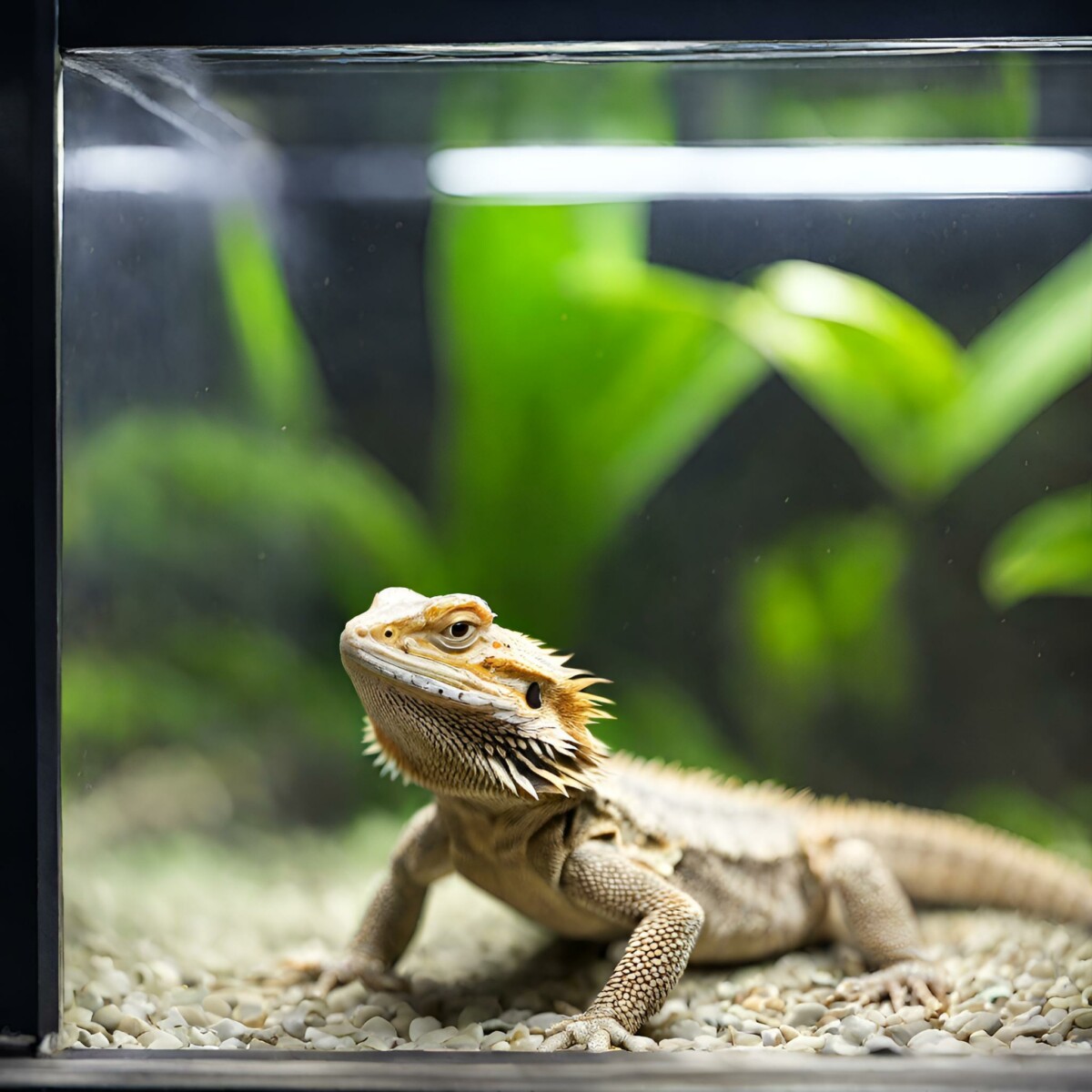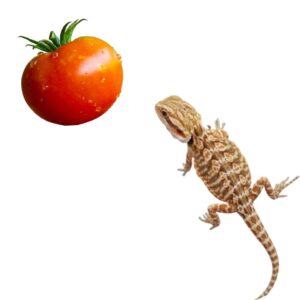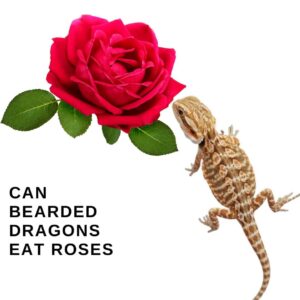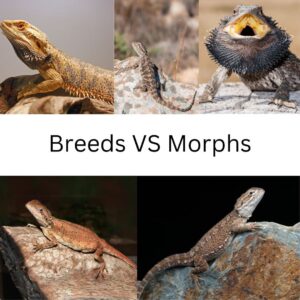Bearded dragons can live up to 10 years on average, with exceptions living up to 17 years. But as they age, they require special care to keep them healthy and happy.
If you’re the proud owner of an old bearded dragon, you know it is not easy to start noticing bearded dragon old age signs, but this doesn’t mean you can’t enjoy life with a happy and healthy senior.
In this article, we’ll provide tips on how to care for an old bearded dragon, including diet, habitat, and health.
Let’s get to it 🙂
How to Care for An Old Bearded Dragon: Table of Contents
How old is an elderly bearded dragon?
At what age is a bearded dragon considered old?
Each bearded dragon ages differently, influenced by genetics, individual health, and quality of care.
Therefore, an “elderly” bearded dragon could be:
- Generally: Between 6-10 years old, depending on the breed and individual health.
- Specifically: For a well-cared-for bearded dragon living past its average lifespan, “elderly” could be closer to 12-15 years.
If you are adopting a grown beardie, and want to know more about the lifespan you can read our: How old is my bearded dragon post.
Around age 6-7, bearded dragons start showing signs of aging, like:
- Decreased activity and appetite
- Duller scales
- Slower movement
- Reduced beard puffing or aggression
How to care for an old bearded dragon at home
Since metabolism, movement and energy levels in geriatric bearded dragons are different some changes will be necessary.
Understand the Aging Process
Like all living creatures, bearded dragons go through a natural aging process that affects their physical and mental health. As they get older, their metabolism slows down, which can lead to weight gain and other health issues. They may also become less active and more prone to illness.
Watch for Signs of Health Issues
Signs of health issues, such as loss of appetite, lethargy, and changes in behavior can be indicators of more serious health problems that require immediate attention from a veterinarian.
Provide a Comfortable Living Environment
They need a spacious enclosure with plenty of hiding spots and basking areas. The enclosure should also be kept at a consistent temperature and humidity level to help maintain their health.
Provide a Nutritious Diet
They require a more varied and nutritious diet that includes plenty of fresh vegetables and fruits, as well as live insects. It’s also important to avoid feeding them high-fat or low-nutrient foods, which can contribute to weight gain and other health issues.
Offer Regular Exercise and Mental Stimulation
You can provide these by adding climbing structures, toys, and other enrichment activities. Taking your bearded dragon outside for some fresh air and sunshine can be beneficial for their physical and mental health.
Provide Regular Veterinary Care
It’s recommended to take them for check-ups at least once a year, and more frequently if they have any health issues. Your veterinarian can also help you develop a specialized care plan to meet your bearded dragon’s unique needs.
Monitor their Weight and Health
Regularly weigh them to ensure they are maintaining a healthy weight, and watch for any signs of illness or injury. If you notice any changes in their behavior or physical health, contact your veterinarian right away.
Be Mindful of Changes in Behavior
They may become less active or more aggressive or develop new habits or preferences.
Consider Specialized Care Needs
They may need additional lighting or heating, or they may require medication for age-related health issues.
Provide Plenty of Love and Attention
Bearded dragons, like all pets, thrive on love and attention. This can help keep them mentally and emotionally healthy and can make their golden years as enjoyable as possible.
Make Accommodations for Mobility Issues
They may experience mobility issues, such as arthritis or muscle weakness. It’s important to make accommodations for these issues by providing ramps or low platforms to make climbing easier, as well as adjusting the height of their basking areas to make them more accessible.
Be Patient and Understanding
Caring for an old bearded dragon can be challenging, but it’s important to remain patient and understanding. As they age, they may become less active or more easily stressed, which can make them more difficult to handle. It’s important to work with your bearded dragon at their own pace and avoid overwhelming them with too much activity or stimulation.
Seek Support from Other Bearded Dragon Owners
It can be helpful to seek support from other bearded dragon owners who have experience with aging reptiles. Online forums and local reptile clubs can be great resources for advice, tips, and emotional support.
Prepare for End-of-Life Care
As your bearded dragon reaches the end of their life it’s important to consider your bearded dragon’s quality of life and make decisions that are in their best interests.
How do you feed an old bearded dragon?
Precise nutrition and hydration are a must for all bearded dragons, but it becomes even more important as they age because their metabolism slows down and they become less active.
Older dragons require a softer diet with more plant matter and less animal protein.
You may also need to provide additional supplements to help support their health, such as calcium or vitamin D3.
Here is our quick food guide for senior bearded dragons:
Protein
The optimal amount of protein in their diet should be between 10% and 15%.
You can provide protein through insects such as crickets, and superworms, and through occasional feedings of cooked chicken or fish.
Vegetables
Vegetables should make up the bulk of a senior bearded dragon’s nutrient-rich diet.
You can offer leafy greens such as collard greens, turnip greens, mustard greens, squash, carrots, and sweet potatoes.
Calcium
Calcium plays a big role in maintaining healthy bones. You can provide calcium by dusting their food with a calcium supplement a few times a week. You can also offer calcium-rich foods like kale, bok choy, dandelion greens, calcium-dusted crickets, or calcium-fortified insects.
Avoid feeding your older dragon insects that are high in phosphorus, such as mealworms.
Water
Senior bearded dragons may be more prone to dehydration. You can also provide water through regular misting or bathing.
Make sure your senior bearded dragon has access to clean, fresh water at all times. You can offer water in a shallow dish or use a misting system to provide humidity and drinking water.
Limit treats
Offer healthy options like small pieces of fruit or vegetables as vocational treats to avoid weight gain and mineral buildup.
Monitor your senior bearded dragon’s weight
If you notice your bearded dragon is gaining weight, reduce the amount of food you feed them.
If you notice your old bearded dragon losing weight, first increase their food intake or consult with a veterinarian to ensure there are no underlying health issues.
Old bearded dragons losing a lot of weight could be a sign of an underlining medical issue and should be checked by the vet ASAP.
If you notice old bearded dragon won’t eat greens anymore first try offering fruits such as berries or apples as a treat.
Be mindful of the size of the food offered to senior bearded dragons
Their jaw muscles may weaken, making it more difficult to chew and swallow larger bites. Consider cutting up vegetables into smaller pieces and choosing smaller insects to feed.
Increase the frequency of feeding
Older bearded dragons may not be able to eat as much in one sitting, so offer smaller meals more frequently. Aim to feed your old bearded dragon 2-3 times per day.
Bearded dragons require calcium and vitamin D3 for healthy bones.
Whether you choose a liquid or powder variety, always make sure the supplements don’t contain phosphorus.
Twelve hours of UVB exposure a day is ideal for bearded dragons to produce vitamin D3, which helps calcium absorption.
Use a mercury vapor UVB bulb that is not blocked by a screen, plants, or glass
Avoid over-supplementation: Too much calcium or vitamin D3 can also be harmful to your bearded dragon. Use supplementation per instructions.
read more about the bearded dragon diet here.
How to care for an old bearded dragon – health tips
Common health issues that senior bearded dragons may experience:
Metabolic Bone Disease (MBD) in senior bearded dragons
MBD is caused by a lack of calcium and/or Vitamin D3 and can result in severe skeletal abnormalities, making movement painful for your pet, and potentially leading to limb paralysis or anorexia.
Symptoms of MBD include:
- leg abnormalities,
- spinal aberrations,
- jaw distortions,
- shell softening,
- uncontrollable movements,
- anorexia,
- defecating issues,
- bone fractures,
- lethargy,
- weakness,
Some dragons may also experience reluctance to move, hard lumps along the legs, spinal column, or jaw, and bowed legs.
For example, 9 year old bearded dragon losing leg motion could be a sign of MBD.
Preventing MBD is crucial, but if your bearded dragon has developed the disease, there are a few treatments that can be used.
First, your veterinarian may recommend a dietary supplement that contains calcium, vitamin D3, and other essential nutrients. They may also prescribe a specialized UVB lighting system, as UVB exposure is essential for the absorption of calcium and vitamin D3.
If MBD has progressed to a severe stage, hospitalization may be necessary to provide fluid therapy, medication, and pain management. Severely affected dragons may also require a special diet or tube feeding to maintain their nutrition.
Consult with a veterinarian who specializes in reptiles and amphibians.
Your vet will be able to assess the severity of the disease and recommend the appropriate treatment for your pet.
Impaction in Senior Bearded Dragons
Impaction occurs when the bearded dragon’s digestive tract becomes blocked by substrate or undigested food, and it can result in serious health complications, even death if left untreated.
Some common symptoms of impaction in senior bearded dragons include:
- mobility issues,
- weight loss,
- inability to eliminate,
- regurgitation,
- trouble walking,
- loss of use of back legs,
- bump or curvature in the lower spine,
If you suspect that your senior bearded dragon is suffering from impaction, it is important to seek veterinary attention immediately.
A veterinarian who specializes in exotic animal medicine can diagnose and treat impaction with medications, dietary changes, and other supportive treatments
A vet will take an X-ray and determine the severity of the impaction and develop a treatment plan from there, be it laxatives, an enema, or surgery.
Surgery is usually a last resort and is only recommended in severe cases where other treatments have failed.
Kidney disease in senior bearded dragon
Kidney disease, also known as renal disease, is a serious condition that affects the functioning of the kidneys in bearded dragons.
Symptoms of kidney disease in bearded dragons may include:
- lethargy,
- loss of appetite,
- weight loss,
- dehydration,
- weakness,
- abnormal feces
- diarrhea,
- sunken eyes
- increased thirst and urination
A veterinarian may need to do additional testing to verify that a bearded dragon has kidney disease. These tests could include blood testing, urine testing, radiography, and ultrasonography exams.
Treatment for kidney disease in bearded dragons may involve medication, dietary changes, and hydration. Specific management is geared toward the underlying cause (if known) as well as the stage of the disease.
A bearded dragon in any stage with increased creatinine or BUN will most likely be treated with medication.
Respiratory Infections in Senior Bearded Dragons
Respiratory infections in bearded dragons can be caused by bacteria, viruses, and fungi.
Symptoms of respiratory infections in senior bearded dragons can include:
- coughing,
- wheezing,
- runny nose,
- nasal discharge,
- difficulty breathing,
- lethargy,
- loss of appetite,
- weight loss
Treatment for respiratory infections in senior bearded dragons will depend on the severity of the infection.
In mild cases, it may be enough to maintain a clean and well-maintained habitat, while in severe cases, antibiotic therapy may be required.
If the infection is caused by a fungus, antifungal medications may be prescribed.
Tumors in senior bearded dragons
Tumors are defined as firm tissue growths that may occur on the body, under the skin, or within the body cavity. They are abnormal cells that grow and multiply out of control.
Cancer can affect any part of a bearded dragon’s body, and malignant cells can proliferate into large or small tumors. These cells can spread through the lymphatic system and bloodstream.
Early detection and prompt treatment are important for the best possible outcome.
The most common symptoms of tumors in bearded dragons include:
- sudden weight loss,
- lack of appetite,
- visible lumps on different parts of the body
- unusual changes in your bearded dragon’s behavior or appearance
Different types of tumors can affect bearded dragons, including:
- sarcoma: Sarcomas can occur in any part of the body
- squamous cell carcinoma (SCC). SCC usually appears as a raised bump or lump on the skin.
- gastric neuroendocrine carcinomas.
- bone tumors,
- brain tumors,
- soft tissue tumors,
- lung cancer
- pancreatic cancer.
- Germ cell tumors are another type of malignant tumor that can contain a variety of tissue types, including seminoma, choriocarcinoma, embryonal carcinoma, endodermal sinus tumor, and teratocarcinoma.
- There are specific types of tumors, such as Adenoid Cystic Carcinoma, Adrenal Gland Cancer, Amyloidosis, Anal Cancer, Ataxia-Telangiectasia, Atypical Mole Syndrome, Basal Cell Carcinoma, and Bile Duct Cancer.
The diagnosis of tumors in bearded dragons is made through a variety of methods, including
- physical examination,
- blood tests, X-rays,
- biopsies.
A biopsy is one of the most common methods, and it involves taking a small tissue sample from the tumor and analyzing it under a microscope.
The treatment of tumors in senior bearded dragons usually involves surgical removal of the tumor.
Unfortunately, there is no guarantee that cancer will go away completely, but surgery can improve the quality of life of the bearded dragon.
Other treatments may include chemotherapy, radiation therapy, and supportive care.
In addition to cancer, abscesses can also appear as tumor-like swellings anywhere on the body of a bearded dragon. An abscess is a swollen infected area within the body tissue containing an accumulation of pus.
How to care for an old bearded dragon – environment tips
A suitable environment for senior bearded dragons includes maintaining temperature and humidity levels, ensuring an appropriately sized enclosure with lighting, and maintaining a clean environment with the use of reptile-safe disinfectants and substrates
Temperature for senior bearded dragons
The basking area should have a temperature range of 95-105°F, and the cooler side of the enclosure should be around 75-85°F .
Ensure the temperature gradient in the enclosure to help bearded dragon move between the different temperature zones as needed.
Humidity for senior dragons
The humidity level should be moderate, around 35 – 40% relative humidity Providing a water pan that is large enough for the whole dragon to soak its body can help increase humidity levels and prevent dehydration.
Enclosure for senior bearded dragons
The enclosure should be large enough for the bearded dragon to move around comfortably, with a minimum size of 40-50 gallons for one bearded dragon.
Lightning for senior bearded dragons
Senior bearded dragons require UVB lighting, which helps with calcium absorption and overall health
Replace bulbs regularly according to manufacturer recommendations.
Maintaining a clean enclosure
The enclosure should be spot-cleaned daily and deep-cleaned once a month. The water pan should be replaced daily and disinfected with dilute bleach at least once a week.
Products such as reptile-safe disinfectants and substrates can also be used to maintain a healthy environment for senior bearded dragons.
Substrate
Bearded dragons should not be kept on loose substrates such as sand or wood chips, as these can cause impaction if ingested.
Instead, reptile carpets, tiles, or newspapers are recommended.
Clay substrate, also known as excavator clay, can also be a suitable option for bearded dragons.
A bioactive substrate, containing good bacteria and macroorganisms, can help combat harmful bacteria produced by waste matter and stagnant air.
Keep substrate hygiene to prevent any potential infections or illnesses.
Hides: Bearded dragons require a variety of hides in their habitat to provide them with places to rest and feel secure. Provide hides that are appropriately sized for your senior dragon.
Enrichment: Provide plenty of climbing opportunities, plants, and other decor to keep your senior bearded dragon stimulated and comfortable.
Behavioral Changes in older bearded dragons
Behavioral changes in older bearded dragons can be caused by physical or mental health conditions, or by a combination of both.
In addition to medical reasons, changes in behavior can also be due to changes in their environment, such as new stressors, household changes, and aging.
If you notice changes in otherwise normal behaviors, such as arm waving, head bobbling, color changes try providing mental stimulation through interaction and challenges.
If behavioral changes are followed with any of the symptoms previously mentioned in the article, schedule a vet visit.
Normal behavioral changes include:
- The bearded dragon is less active and requires more sleep.
- They may also become more territorial or less social, so it is important to respect your dragon’s preferences and allow them to have their own space.
- Older dragons may also become more sensitive to changes in their environment, so it is important to keep their habitat consistent and avoid making sudden changes.
How to Care for An Old Bearded Dragon: Vet Q&A
Q1. Can I still feed my older dragon insects?
A: Yes, but you should choose insects that are high in calcium and low in phosphorus, such as crickets dusted with calcium powder.
Q2. How often should I take my older dragon to the vet?
A: You should take your older dragon to the vet at least once a year for a check-up and more frequently if you notice any changes in their behavior or health.
Q3. Can I keep my older dragon in the same enclosure as a younger dragon?
A: It is not recommended to keep older and younger dragons together as they may have different nutritional and social needs.
Q4. How can I tell if my older dragon is sick?
A: Behavioral signs are the first indicators of illness. Stress is also an indicator of health, if you notice stress marks consult a professional on changes needed.
Q: How often should I feed my old bearded dragon?
A: Aim to feed your old bearded dragon 2-3 times per day.
Q: What should I do if I notice a change in my bearded dragon’s weight?
A: Consult with a reptile veterinarian if you notice any significant changes in your bearded dragon’s weight.
My Senior Paws is a participant in the Amazon Services LLC Associates Program, an affiliate advertising program designed to provide a means for sites to earn advertising fees by advertising and linking to Amazon.com. We also participate in other affiliate programs which compensate us for referring traffic.




